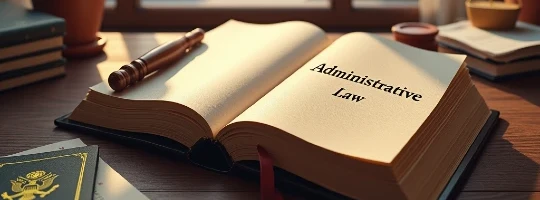
Administrative law is the pillar that guarantees that the public bodies behave within the boundaries of the law and for the advantage and betterment of the society. It ensures that government personnel follow correct procedures and respect values of justice and openness, as demonstrated by human rights law, through a regulatory system that holds them accountable.

Fundamentally, administrative law is the rule book for government agencies. It governs everything from policy execution and rule development to dispute resolution arising from administrative decisions. Applied across a broad spectrum—including environmental control, immigration, taxation, and public procurement—this field is essential for preserving public confidence and responsibility.
Anyone who interacts with government entities needs to understand administrative law. This area of law provides the legal channels for redress, whether your business is confronted with regulatory issues, a citizen is affected by public policy decisions, or an individual wishes to contest an undesirable administrative action. It empowers people to challenge actions that are deemed illegal, illogical, or procedurally unjust.

At its core, administrative law is built on the principles of legality, justice, and openness. Public agencies are required to follow accepted protocols and operate within the limitations of their statutory authority. They must provide explicit justifications for their decisions so that affected parties can understand and, if necessary, challenge these decisions through judicial review. Such measures help prevent arbitrary or biased policies within public administration.

A key technique in Administrative Law is judicial review. This process enables courts to scrutinise public body decisions to ensure their legality and the fairness of the decision-making process. Judicial review ensures that any decision compromising individual rights can be thoroughly examined and, if justified, reversed, thereby checking the exercise of governmental authority.
Administrative law is the framework that ensures our government operates with responsibility and integrity, rather than merely a set of guidelines and rules. It upholds public confidence in the decision-making processes of government agencies by emphasising justice, openness, and legality, thereby safeguarding individual rights. Whether a government decision directly affects you or you are simply interested in understanding how public administration operates, a comprehensive knowledge of this field is absolutely essential. Seeking professional legal assistance is the best course of action if you require further guidance or wish to contest an administrative decision, ensuring that your rights are robustly protected by the principles of local government law.

Candidates for a UK family visa must have a qualifying relationship with a UK resident—that of a spouse, partner, child, parent, or relative requiring long-term care. Candidates also have to pass specific English language Test and financial requirements. On the official UK government website, one may get all the necessary information.
Usually, applications for UK family visas are made online via the official gov.uk website. Steps include completing the application form, supplying required proof of the relationship and fulfilling other criteria, and paying the relevant fees. The UK government website offers thorough direction but if you are unclear or need legal guidance and support, feel free to give us a call on 0203 345 2000.
Sponsors of the spouse or partner visa application have to show a minimum annual income, which is £29,000 per year as of the most recent changes. This number is subject to change hence it is advisable to refer to the most recent policies on the website of the UK government.
Yes, assuming you still fit the eligibility criteria, you can seek to extend your stay. Or you can change to another family visa category if you are already in the UK on a family visa. Applications have to be made before your present visa runs out.
Further information can be found on the official gov.uk website. Otherwise, if you are looking for legal guidance and support throughout the process, feel free to give us a call on 0203 345 2000 or fill up a call back request form on this page.

Please provide as much information as you can using this form. This will help us save time by having the most appropriate and relevant team member to contact you.
If you prefer not to share information in writing, you can request a call back using any of the other forms above.
Please make sure to send us your mobile number and email address so that we can contact you promptly.
RakLAW Solicitor Ltd is regulated and authorised by Solicitors Regulation Authority, SRA No. 8007405 and is a company registered in England & Wales under company number 14835989 Registered Office: 42 Shad Thames, London, SE1 2YD